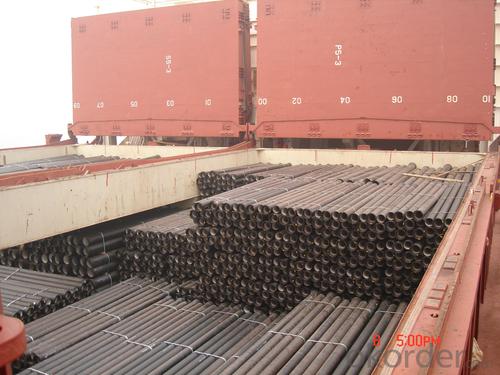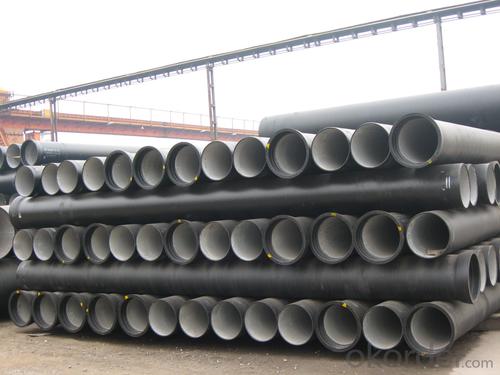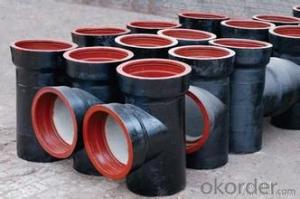DUCTILE IRON PIPE DN1000 K8/C/K9
- Loading Port:
- China Main Port
- Payment Terms:
- TT OR LC
- Min Order Qty:
- -
- Supply Capability:
- -
OKorder Service Pledge
OKorder Financial Service
You Might Also Like
Specification:
1) The standard of pipe: ISO2531:1998, K9
2) Effective length: 6m
3) Inner cement line: Portland cement line as per ISO4179
4) Zinc coating: at least 130g/m2 as per ISO8179
5) Bitumen painting: at least 70um as per ISO8179
6) With 100% quantity of NBR ring, or SBR ring, or EPDM ring as per ISO4633
7) DN80mm-800mm
8) High strength, lighter than grey iron, good corrosion resistance, no furring, small flow resistance, easy fixing, long life tome about 100 yeas
9) Produced by Hangzhou chunfeng machine
10) Checked by automatic inspection equipment
11) Composition:
Chemical composition | | | | |||
Chemical composition | Ductile Cast Iron Pipe (%) | Grey iron pipe (%) | Steel pipe (%) | | | |
C | 3.5-4.0 | 3.2-3.8 | 0.1-0.2 | | | |
Si | 1.9-2.6 | 1.4-2.2 | 0.15-0.4 | | | |
Mn | 0.15-0.45 | 0.4-0.6 | 0.3-0.6 | | | |
P | ≤0.06 | ≤0.3 | 0.02-0.03 | | | |
S | ≤0.02 | ≤0.1 | 0.02-0.03 | | | |
Mg | 0.03-0.06 |
|
| | | |
12) Feature:
Mechanical properties | | | | |||
| Ductile Cast Iron Pipe | Grey Iron Pipe | Steel Pipe | | | |
Tensile Strength(Mpa) | ≥420 | 150-260 | ≥400 | | | |
Yield Strength(Mpa) | ≥300 | No Confirmation | No Confirmation | | | |
Bending Strength(Mpa) | ≥590 | 200-360 | ≥400 | | | |
Elongation (%) | ≥10 | Neglected | ≥18 | | | |
Brinell Hardness(HBS) | ≤230 | ≤230 | About 140 | | | |
13) T type mechanical joint
14) Packing: in bulk or container
- Q: Are ductile iron pipes suitable for irrigation systems?
- Yes, ductile iron pipes are suitable for irrigation systems. Ductile iron pipes are known for their durability, strength, and resilience, making them an ideal choice for various applications, including irrigation systems. These pipes can withstand high water pressure and are resistant to corrosion, which is essential for ensuring the efficiency and longevity of an irrigation system. Additionally, ductile iron pipes have a smooth interior surface, minimizing friction and allowing for efficient water flow, ensuring that the irrigation system operates optimally. Moreover, ductile iron pipes have a long lifespan, reducing the need for frequent replacements and maintenance, making them a cost-effective option for irrigation systems. Overall, due to their durability, strength, corrosion resistance, and efficient water flow, ductile iron pipes are highly suitable for use in irrigation systems.
- Q: Why is the sound speed of nodular cast iron lowered after heat treatment?
- After the heat treatment, the microstructure of the material changes, the graphite changes, eliminating the internal stress of molecules, thus slowing down the speed.
- Q: Can ductile iron pipes be repaired if they are damaged?
- Yes, ductile iron pipes can be repaired if they are damaged. The extent of the damage will determine the type of repair that is needed. In cases where the pipe is cracked or has small holes, a repair clamp or a stainless-steel sleeve can be used to seal the damaged area. These methods provide a temporary fix and allow for the flow of water to continue until a more permanent repair can be made. For more severe damage, such as large cracks or broken sections, a full replacement may be necessary. This involves cutting out the damaged section of the pipe and installing a new piece. This process requires specialized equipment and expertise, but it can effectively restore the functionality of the pipe. It is important to note that the repair of ductile iron pipes should be carried out by trained professionals who have experience in working with this type of material. This ensures that the repairs are done correctly and do not compromise the integrity and safety of the pipeline system. Regular inspection and maintenance of ductile iron pipes can help identify any potential issues early on and prevent extensive damage that may require replacement rather than repair.
- Q: How does ductile iron pipe perform in seismic areas?
- Ductile iron pipe performs exceptionally well in seismic areas due to its inherent strength and flexibility. Seismic activity can subject pipelines to significant ground movements and vibrations, and ductile iron pipes have proven to be highly resilient in such conditions. The unique properties of ductile iron, including its high tensile strength and ductility, allow it to absorb the energy generated during seismic events. This ability to flex and bend without breaking or fracturing makes it an excellent choice for areas prone to earthquakes. Furthermore, ductile iron pipes are designed and manufactured to withstand external forces and ground movements. They are often installed with flexible joints that can accommodate ground shifts and maintain the integrity of the pipeline system. These joints can absorb lateral and angular movements, reducing the risk of pipe failure. Additionally, ductile iron pipes have a long history of successful performance in seismic areas. They have been extensively tested and proven to meet or exceed industry standards for seismic resistance. This reliability is crucial in ensuring the safety and functionality of water and wastewater systems, even in the event of a seismic event. Overall, ductile iron pipe is a reliable and durable choice for pipelines in seismic areas. Its ability to withstand ground movements, its flexibility, and its proven track record make it an excellent option for ensuring the integrity and functionality of water and wastewater systems in earthquake-prone regions.
- Q: Is the fire hose capable of using rapid repair joints?
- Clear。 Before installation, cleaning work should be carried out, the parts to be cleaned include: socket end, the mouth of the socket, the corner of the socket to the white line should be smooth, no sharp points, so as not to wear aprons when installation.
- Q: Can ductile iron pipes be used for underground storage of hazardous materials?
- No, ductile iron pipes should not be used for underground storage of hazardous materials. Ductile iron pipes are commonly used for water and sewage systems due to their durability and corrosion resistance. However, they are not designed to withstand the specific requirements and potential hazards associated with storing hazardous materials underground. When it comes to underground storage of hazardous materials, it is crucial to use materials that are specifically engineered to handle the chemical properties and potential risks associated with these substances. Specialized materials such as high-density polyethylene (HDPE) or fiberglass reinforced plastic (FRP) are commonly used for underground storage tanks due to their excellent chemical resistance and ability to maintain structural integrity over time. Using ductile iron pipes for such purposes may lead to corrosion, leaks, or even catastrophic failures, resulting in environmental contamination and potential harm to surrounding areas. Therefore, it is essential to consult with experts and adhere to applicable regulations and guidelines when selecting materials for underground storage of hazardous materials to ensure safety and prevent potential hazards.
- Q: What is the typical wall thickness of ductile iron pipes?
- The typical wall thickness of ductile iron pipes can vary depending on the specific application and diameter of the pipe. However, in general, ductile iron pipes commonly have a wall thickness ranging from around 0.25 inches to 0.5 inches.
- Q: Can ductile iron pipes be used for submarine pipelines?
- Yes, ductile iron pipes can be used for submarine pipelines. Ductile iron is known for its high strength and durability, making it suitable for various applications, including underwater installations. Ductile iron pipes have been successfully used in the construction of submarine pipelines for several decades. They can withstand the harsh conditions of underwater environments, such as corrosion, pressure, and shifting seabed. Additionally, ductile iron pipes have excellent resistance to external loading, making them ideal for submarine pipelines that need to withstand the weight of water and potential impacts. However, it is important to consider factors such as coating, cathodic protection, and proper installation techniques to ensure the long-term performance and integrity of the submarine pipeline.
- Q: Advantages and disadvantages of ductile iron pipes?
- Ductile iron pipes are commonly made of flexible sealing rings and slip through connections. The main mechanisms are W and B, clamps and mechanical connections, and inner gaskets.
- Q: Can ductile iron pipes be used in tunneling or microtunneling projects?
- Tunneling or microtunneling projects can utilize ductile iron pipes. These pipes possess strength, durability, and flexibility, making them appropriate for underground applications. They can endure the external pressure from the surrounding soil or rock during tunneling, guaranteeing the project's integrity and safety. Furthermore, ductile iron pipes exhibit exceptional corrosion resistance, a vital characteristic for tunneling projects where the pipes are exposed to moisture and other corrosive substances. Moreover, their internally smooth surface facilitates the fluid or material flow through the pipes, rendering them an optimal selection for tunneling or microtunneling projects.
Send your message to us
DUCTILE IRON PIPE DN1000 K8/C/K9
- Loading Port:
- China Main Port
- Payment Terms:
- TT OR LC
- Min Order Qty:
- -
- Supply Capability:
- -
OKorder Service Pledge
OKorder Financial Service
Similar products
Hot products
Hot Searches
Related keywords



























